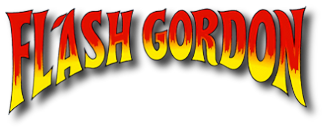
Of all the classic adventure strips, perhaps none is as famous, as influential and as
legendary as Flash Gordon. Science-fiction fans who have been following Flash's exploits
for years have come to rely upon the intrepid adventurer for exotic thrills and breakneck
action.
Legends often are created by legends, and Flash Gordon is no exception. Alex Raymond,
whose previous work included Tim Tyler's Luck and Secret Agent X-9, inspired an entire
generation of comic-strip artists and fans with his creation of the galactic hero Flash
Gordon.

Alex Raymond was born October 2, 1909 in New Rochelle, New York. After studying at the
Grand Central School of Art, young Alex went to work for cartoonist Russ Westover ghosting
"Tillie the Toiler" in 1930 & 31 and then worked with Lyman Young on "Tim Tyler's Luck"
and brother Chic Young's "Blondie" from 1931 until 1933. Late in 1933, Raymond was given
the assignment of creating a science fiction strip to compete with Buck Rogers, and along
with writer Don Moore created "Flash Gordon" and "Jungle Jim".
Making their first appearance on January 7, 1934 Flash Gordon was a smash hit. At the
same time, Raymond teamed with mystery writer Dashiell Hammett to create "Secret Agent X-9".
Though his early pages are very plain and cartoonish, it would not be long before Alex
developed a spectacular "dry-brush" style that would make him one of the most influential
artists of his time. Clean fresh strokes flowing like water throughout the panels with what
comics legend Harvey Kurtzman described as a sensual quality. His Sunday episodes were so
popular they appeared on the second page of the comic section behind George McManus'
Bringing Up Father.
In 1944 Raymond left the strip and joined the Marines, fighting in the Pacific theatre
on the battleship Gilbert Islands, leaving the armed services as a Major in 1946.
After returning home, Raymond successfully syndicated his fourth comic strip, "Rip Kirby".
A scientific detective, Rip was no less popular than Raymond's other creations.
Raymond's art influenced hordes of talented comics artists. Among them are Frank Frazetta,
Al Williamson, Phil Davis, Lou Fine and Wayne Boring, and through their art he has influenced
scores of others. A giant in the field he served as president of the National Cartoonist's
Society for two years (1950, 51) and had his work showcased in books, and magazines including
a spread in a 1940 issue of Life.
His life was unexpectedly cut short in a car accident on September 6, 1956.










